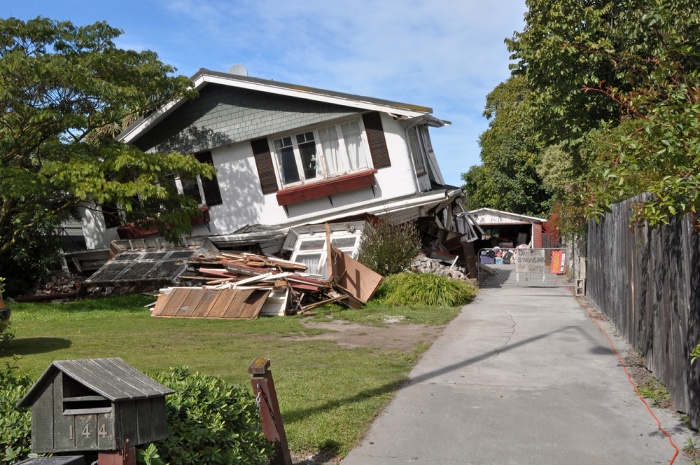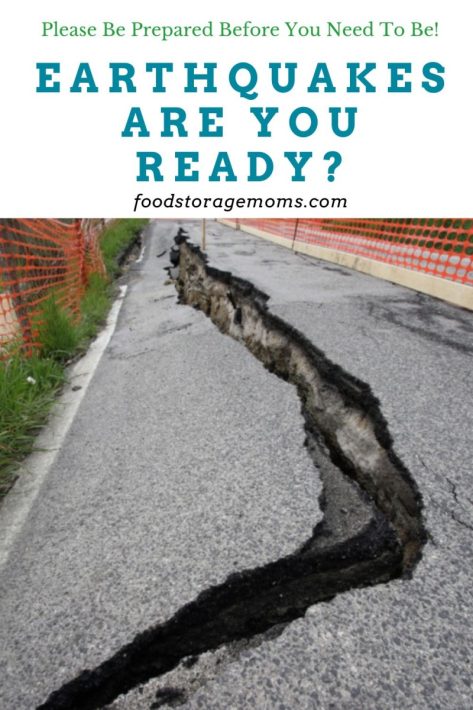
There is no getting around this, my friends. Are you ready for earthquakes to hit your city? Utah has been on high alert for decades for the “Big One.” We got some aftershocks from California’s 7.1 quake some time ago, and other surrounding states did too. I heard of people sleeping outside on the news because their house was unsafe. Just this week, a section of Southern California experienced a series of earthquakes in the 5.2 – 5.7 range. They appear to have caused limited damage, but they tend to scare people and hopefully prompt them to better prepare.
You may have seen grocery stores closed and the open ones’ shelves empty or inventory all over the floor from quakes in your area. Some things to think about acquiring if you haven’t already are an emergency radio, lanterns, solar and battery-powered flashlights. This post was originally written in 2019; it may help a family or two review their emergency and disaster plan details and make adjustments as needed.

The time is now to be prepared and stop making excuses for not being prepared. Most of you are trying to be ready or you wouldn’t faithfully follow my blog. We all know like-minded people stick together because they get it. They understand you can’t run to the grocery store to get a flashlight after a minor or major disaster because the stores will probably be empty or closed for repairs.
Oh, and forget about getting packaged water; it will be one of the first things to disappear. I can promise you that I will not, and I repeat, I will not be standing in line to get water or food from the city and county buildings after a disaster. If my house still stands, I will sit on my couch sipping water from my 20-ounce water jug with my stored water as one of my resources.
Earthquakes
What Is An Earthquake?
According to Wikipedia, “An earthquake is the shaking of the surface of the Earth, resulting from the sudden release of energy in the Earth’s lithosphere that creates seismic waves. Earthquakes can range in size from those that are so weak that they cannot be felt to those violent enough to toss people around and destroy whole cities.”
What Should I Do Before An Earthquake?
We have prepped for disasters, but here’s a reminder for the bare minimum items you must stock NOW, not next week or next year. We must be prepared for an earthquake, hurricane, flooding, or fire. The location where we live may be more prone to a particular disaster event, and we need to prep for those first, but I suggest you prep for other events too, just in case. I highly recommend the following items:
- A suitable fire extinguisher.
- Flashlights, solar or battery type (store extra batteries).
- First Aid Kit FIRST AID KIT by Linda
- Good sturdy shoes by your bed.
- A good battery or hand-crank radio.
- Keep your phones charged more often.
- Purchase something to charge your phone, preferably solar-powered.
- Keep your gas tank 3/4 full at all times.
- Make a plan with your family, using several scenarios to find each other after a disaster (please role-play with family members by doing earthquake drills). You should perform a drill on a consistent basis as kids get older and activities, particularly those away from home, become more common.
- Have water stored, plan to have at least 4 gallons per person per day to cover hydration, cooking, personal hygiene, and limited laundry tasks.
- Have food stored for a minimum of 30 days. The stores you typically use may be closed or the shelves empty. Non-perishable foods should be a priority.
- Learn where to turn off your gas, water, and electricity utilities NOW (don’t turn off the gas unless you smell gas from a gas leak). You may need to evacuate immediately if there’s a buildup of gas in your home. Make sure your water heater is properly secured to a wall so it won’t fall over and likely break the gas line.
- Secure heavy furniture and objects on shelves that will fall off during an earthquake. Tall furniture should be secured to a wall stud so they don’t tip over. Place heavy objects on the lower shelves to reduce the risk of shelving tipping over. If you have a China cabinet special care should be taken to make sure it’s as secure as possible.
- Have a communication plan in place and practice it monthly (walkie-talkies).
- Have a good whistle on your key ring or in your 72-hour kit.
- Make a DISASTER bucket with the necessary supplies to grab and evacuate your home within seconds.
- If you have questions, contact your home insurance agent and discuss the possibility of getting an earthquake insurance policy.
Fire Extinguisher Tips
Here are some interesting facts about regular fire extinguishers at home, in the garage, or in the car. All fire extinguishers are labeled with specific labels as to which classification of fuel the extinguisher will be effective:
1. Class A Fires: Ordinary combustibles like paper, cloth, wood, rubber, and many plastics
2. Class B Fires: Flammable liquids like oil and gasoline, charcoal lighter, kerosene
3. Class C Fires: Energized electrical equipment like wiring or motors. Once the electricity to those is turned off they become a Class A
4. Class D Fires: Combustible metals like aluminum, magnesium, or titanium
So, when you purchase a fire extinguisher, it is essential to identify the type of fuel you think will be most common combustible at your home, office, garage, etc. You’ll want to select the extinguisher that may be best for each location and situation to do the job correctly.
Where Is The Safest Place To Be?
When I was growing up, the schools taught us to go to any doorway. However, in houses built in the last 20 years, the doorways are no more substantial than the rest. It is a good idea to stay close to an interior wall since they are more often a baring well and you’re away from windows and broken glass. Remember the days we were taught to go under a table years ago? That’s still a good place even today for earthquake safety and away from earthquake hazard.
How Long Does An Earthquake Last?
They typically last 10 to 30 seconds. Because the ground is making readjustments after the earthquake, be prepared for aftershocks for days, weeks, and months. You may still be at risk for more earthquake damage after the initial shaking stops due to those aftershocks.
How Far Do Earthquakes Travel?
Here’s an example: If the magnitude of the earthquake is 5.5 in the Eastern US, you should be able to feel it as far away as 300 miles (500km)
What Country Has The Most Earthquakes?
I quote from USGS: “Indonesia is in a very active seismic zone, but because of its larger size than Japan, it has more total earthquakes. Which country has the most earthquakes per unit area? This would probably be Tonga, Fiji, or Indonesia since they are all in extremely active seismic areas along subduction zones.”
What Is The Most Active Earthquake Zone?
I quote Wikipedia: “The famous and very active San Andreas Fault zone of California is a transform fault which offsets a portion of the East Pacific Rise under the southwestern United States and Mexico; the motion of the fault generates numerous small earthquakes, at multiple times a day, most of which are too small to be felt.”
What Do I Do After An Earthquake?
- Stay calm, you must not show fear, or it may upset other family members, particularly the young.
- Put good shoes on if possible in case you have to go outside.
- Locate family members after checking yourself first for injuries.
- Turn your radio on. Hopefully, you have one that can run on batteries or solar power.
- Check your surroundings to determine if you are safe or need to relocate.
- Stay put inside if you’re inside now; if you’re outside, stay outside until you can evaluate the situation. Stay clear of downed electrical lines and other dangerous debris.
- Please don’t use lighters or matches because they could ignite a fire.
- Skip the candles; don’t light them until it’s determined your home is safe.
- Stay clear of your favorite beaches (Tsunamis possible).
- If you smell gas, open all windows and doors and leave your home. Turn off the gas if possible, not at the appliances using gas, but at the main gas shutoff valve to the home.
- Check your home for water, gas, and electrical equipment damage.
Final Word
I hope today’s post helps you understand more about being prepared for earthquakes. We know it’s inevitable in several areas of the country, so we must be prepared before something hits our neighborhood. We can do this one step at a time. Please remember, when we are prepared, we will have no fear. May God bless this world, Linda
Copyright Images: Earthquake Christchurch Depositphotos_12723688_S By NigelSpiers, Earthquake Landslide Depositphotos_99883362_S By Caranto
The post Earthquakes-Are You Ready? appeared first on Food Storage Moms.
from Food Storage Moms
No comments:
Post a Comment